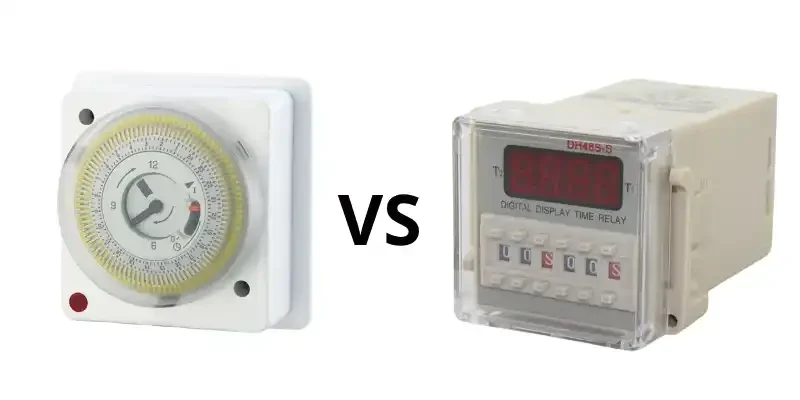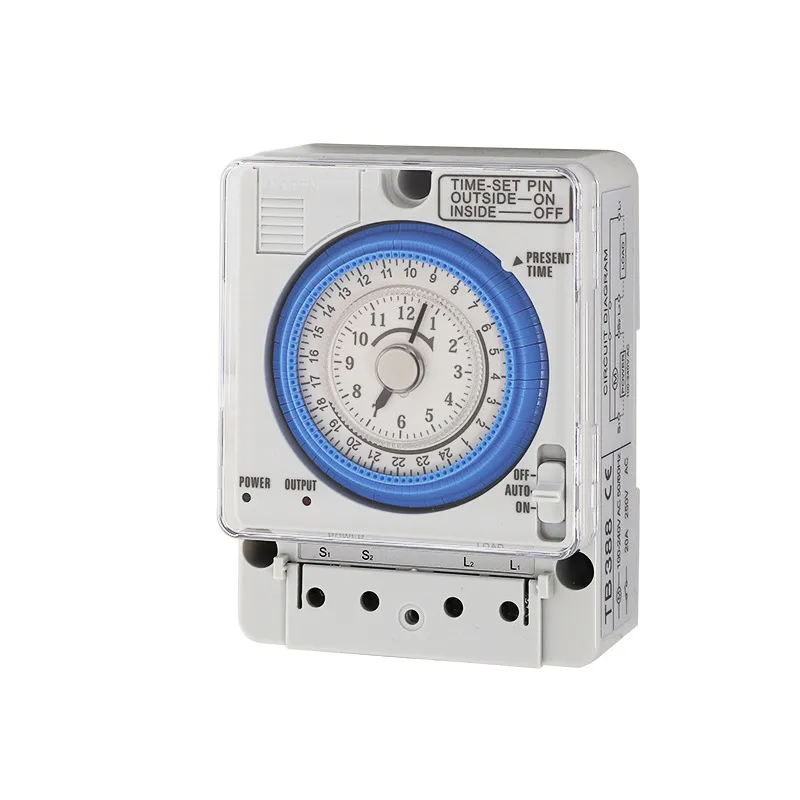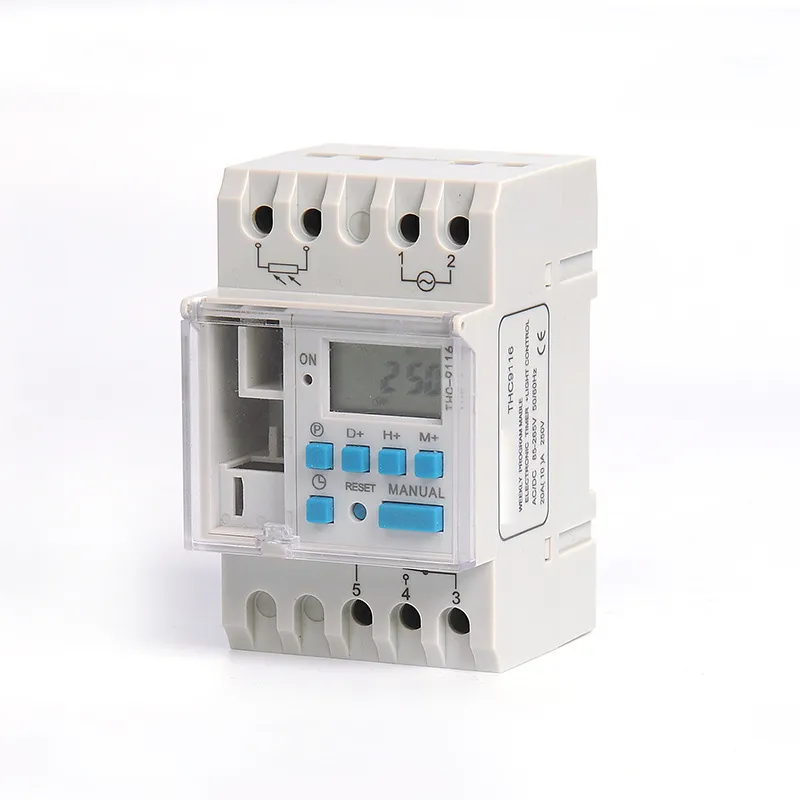Mechanische timers bieden eenvoud en betaalbaarheid, terwijl digitale timers geavanceerde functies en meer precisie bieden voor complexere timingbehoeften.
Mechanische vs. digitale functionaliteit
Mechanische timers werken met bewegende onderdelen zoals tandwielen en veren, waarbij gebruikers de tijd instellen door aan een wijzerplaat te draaien of een knop te verstellen. Digitale timers daarentegen maken gebruik van elektronische technologie, hebben vaak een LCD- of LED-display en programmeerbare instellingen voor nauwkeurige tijdsintervallen. Terwijl mechanische timers voor de timing afhankelijk zijn van de netfrequentie, wat na verloop van tijd tot kleine afwijkingen kan leiden, maken digitale timers meestal gebruik van kwartsoscillatoren of andere elektronische componenten voor een nauwkeurigere tijdmeting.
De keuze tussen de twee hangt vaak af van specifieke behoeften:
- Mechanische timers blinken uit in eenvoud en betaalbaarheid, waardoor ze ideaal zijn voor basistaken op het gebied van timing.
- Digitale timers bieden geavanceerde functies zoals complexe planning en grotere precisie, geschikt voor ingewikkelde timingvereisten.
- De grootte en esthetiek verschillen ook, waarbij mechanische timers over het algemeen groter en omvangrijker zijn, terwijl digitale timers vaak kleiner en visueel aantrekkelijker zijn in moderne omgevingen.
Ontwerp en grootte
Mechanische timers: Deze timers zijn meestal groter en omvangrijker omdat ze afhankelijk zijn van bewegende onderdelen. Ze hebben vaak wijzerplaten of knoppen om de timer in te stellen en zijn gemaakt van materialen zoals staal, waardoor ze minder esthetisch kunnen zijn in moderne huiselijke omgevingen.
Digitale timers: Digitale timers zijn over het algemeen kleiner en ontworpen met een strakke esthetiek in gedachten. Ze hebben vaak een LCD-scherm en knoppen, waardoor ze visueel aantrekkelijk zijn en gemakkelijker te integreren in een moderne inrichting.
Gebruiksgemak
Het gebruiksgemak verschilt aanzienlijk tussen mechanische en digitale timers. Mechanische timers zijn over het algemeen eenvoudiger te bedienen, met eenvoudige wijzerplaten en knoppen die ze gebruiksvriendelijk maken voor basistaken. Digitale timers bieden weliswaar geavanceerde functies, maar kunnen complexer zijn om in te stellen vanwege de vele knoppen en programmeeropties. Deze complexiteit kan een barrière vormen voor sommige gebruikers, vooral voor diegenen die de voorkeur geven aan eenvoudigere interfaces of die minder technisch aangelegd zijn.
- Kostenoverwegingen: Mechanische timers zijn meestal voordeliger, waardoor ze een kosteneffectieve keuze zijn voor eenvoudige toepassingen.
- Digitale timers hebben hogere initiële kosten, maar kunnen op de lange termijn mogelijk geld besparen door energie-efficiëntie en minder onderhoud.
- Stroomverbruik: Digitale timers verbruiken vaak minder stroom dan mechanische timers, wat bijdraagt aan hun kosteneffectiviteit op de lange termijn.
Onderhoud
Mechanische timers: Vereisen meer onderhoud vanwege hun bewegende onderdelen, die na verloop van tijd kunnen slijten. Regelmatige reiniging kan nodig zijn om een goede werking te garanderen.
Digitale timers: Ze hebben doorgaans minder onderhoud nodig omdat ze geen mechanische onderdelen hebben. Ze kunnen echter gevoeliger zijn voor schade door elektrische problemen of omgevingsfactoren zoals vochtigheid.
Stroomverbruik
Mechanische timers: Over het algemeen energiezuiniger, verbruiken ongeveer 1 watt per uur. Dit maakt ze geschikt voor situaties waarin energiebesparing belangrijk is.
Digitale timers: Door hun elektronische onderdelen verbruiken ze meestal ongeveer 2 watt per uur. Ze hebben een continue stroomtoevoer nodig, wat het gebruik op locaties zonder stopcontact kan beperken.
Prijs
Mechanische timers: Ze zijn vaak betaalbaarder dan digitale timers, waardoor ze een kosteneffectieve keuze zijn voor basistoepassingen die geen precisie vereisen.
Digitale timers: Doorgaans duurder vanwege hun geavanceerde functies en mogelijkheden. Ze worden aanbevolen voor gebruikers die flexibiliteit en precisie nodig hebben in hun timingtoepassingen.
Duurzaamheid en geschiktheid voor toepassingen
Duurzaamheid is een belangrijke factor bij de keuze tussen mechanische en digitale timers. Mechanische timers staan bekend om hun robuustheid, vooral in veeleisende industriële omgevingen waar ze bestand zijn tegen zware elektrische belastingen en zware omstandigheden. Deze duurzaamheid maakt ze ideaal voor toepassingen die een langdurige betrouwbaarheid vereisen zonder frequente vervangingen. Digitale timers bieden weliswaar geavanceerde functies, maar kunnen gevoeliger zijn voor omgevingsfactoren zoals temperatuurschommelingen of elektromagnetische interferentie.
- Voor eenvoudige, betaalbare timing in woonomgevingen zijn mechanische timers vaak voldoende.
- In industriële automatisering of scenario's die een nauwkeurige, complexe planning vereisen, blinken digitale timers uit door hun geavanceerde functies en grotere nauwkeurigheid.
- Voor buitentoepassingen of omgevingen met extreme omstandigheden kunnen mechanische timers de voorkeur genieten vanwege hun veerkracht.
De juiste timer kiezen
Bij het kiezen tussen mechanische en digitale timers moet je rekening houden met de volgende factoren:
- Complexiteit van de toepassing: Kies voor mechanische timers voor eenvoudige, rechttoe rechtaan taken zoals basis aan/uit-schema's. Kies digitale timers voor complexe toepassingen die een precieze timing of meerdere schema's vereisen.
- Nauwkeurigheidseisen: Als hoge precisie cruciaal is, bieden digitale timers superieure nauwkeurigheid en programmeerbaarheid.
- Gebruiksgemak: Mechanische timers zijn over het algemeen eenvoudiger te bedienen, terwijl digitale timers navigatie door menu's vereisen maar meer geavanceerde functies bieden.
- Omgevingsomstandigheden: Voor zware industriële omgevingen blijken mechanische timers vaak duurzamer.
- Budgettaire beperkingen: Mechanische timers zijn meestal betaalbaarder, waardoor ze rendabel zijn voor basisbehoeften.
- Beschikbaarheid van stroom: Op locaties zonder betrouwbare elektriciteit kunnen mechanische timers die geen continue stroom nodig hebben de voorkeur hebben.
Beoordeel uiteindelijk uw specifieke behoeften en neem factoren zoals gewenste functies, budget en de omgeving waarin de timer zal werken in overweging om de beste keuze voor uw toepassing te maken.
Conclusie
Kies mechanische timers voor basisbehoeften, betrouwbaarheid en kosteneffectieve timing. Kies voor digitale timers als geavanceerde functies en programmeerbaarheid vereist zijn.




